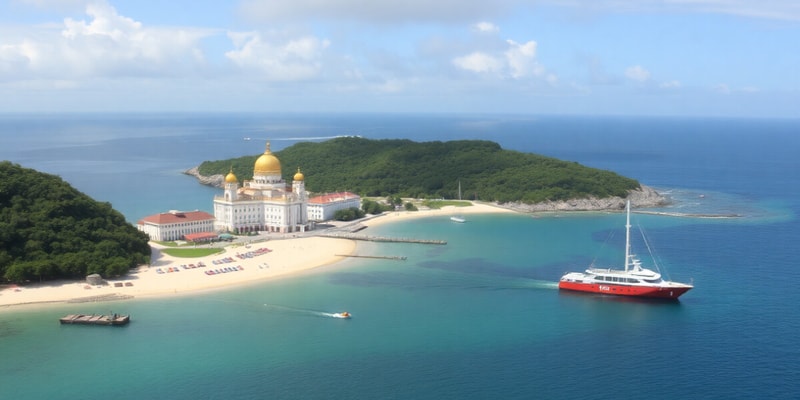Podcast
Questions and Answers
What is the minimum time required between the call for a session and the actual celebration of that session?
What is the minimum time required between the call for a session and the actual celebration of that session?
Which of the following is NOT included in the file that must be opened when calling a session?
Which of the following is NOT included in the file that must be opened when calling a session?
Who is responsible for setting the agenda for the sessions?
Who is responsible for setting the agenda for the sessions?
What must accompany the call for extraordinary sessions?
What must accompany the call for extraordinary sessions?
Signup and view all the answers
What is the role of the General Secretariat regarding notifications for sessions?
What is the role of the General Secretariat regarding notifications for sessions?
Signup and view all the answers
What characterizes ordinary sessions of the Plenary?
What characterizes ordinary sessions of the Plenary?
Signup and view all the answers
Who can call an extraordinary session?
Who can call an extraordinary session?
Signup and view all the answers
What is the maximum period for holding an extraordinary session after a request is made by members?
What is the maximum period for holding an extraordinary session after a request is made by members?
Signup and view all the answers
What must be included as the first point of the agenda for an extraordinary urgent session?
What must be included as the first point of the agenda for an extraordinary urgent session?
Signup and view all the answers
What is required for a member's request for an extraordinary session?
What is required for a member's request for an extraordinary session?
Signup and view all the answers
What happens if the urgency is not appreciated by the Plenary in an extraordinary urgent session?
What happens if the urgency is not appreciated by the Plenary in an extraordinary urgent session?
Signup and view all the answers
What must be substantiated if the Mayor or President excludes matters from the agenda?
What must be substantiated if the Mayor or President excludes matters from the agenda?
Signup and view all the answers
Which type of session does not allow for the calling with a minimum lead time of two working days?
Which type of session does not allow for the calling with a minimum lead time of two working days?
Signup and view all the answers
What is the primary topic of Article 82?
What is the primary topic of Article 82?
Signup and view all the answers
Which of the following can be inferred about the meetings mentioned in Article 82?
Which of the following can be inferred about the meetings mentioned in Article 82?
Signup and view all the answers
What can be deduced about the length of Article 82?
What can be deduced about the length of Article 82?
Signup and view all the answers
What might be a consequence of the style of writing in Article 82?
What might be a consequence of the style of writing in Article 82?
Signup and view all the answers
How does Article 82 approach the topic of meeting agendas?
How does Article 82 approach the topic of meeting agendas?
Signup and view all the answers
Which aspect of meeting agendas is likely missing from Article 82?
Which aspect of meeting agendas is likely missing from Article 82?
Signup and view all the answers
In the context of Article 82, what does the repetitiveness indicate?
In the context of Article 82, what does the repetitiveness indicate?
Signup and view all the answers
What is a likely effect of the lengthy discussion in Article 82?
What is a likely effect of the lengthy discussion in Article 82?
Signup and view all the answers
Which of the following best describes the use of examples in Article 82?
Which of the following best describes the use of examples in Article 82?
Signup and view all the answers
What might be beneficial to include in Article 82 to improve clarity?
What might be beneficial to include in Article 82 to improve clarity?
Signup and view all the answers
Why might Article 82 have a minimal effect on the understanding of meetings?
Why might Article 82 have a minimal effect on the understanding of meetings?
Signup and view all the answers
What does repetition in Article 82 likely imply about the author’s intent?
What does repetition in Article 82 likely imply about the author’s intent?
Signup and view all the answers
Which potential issue arises from the length of Article 82?
Which potential issue arises from the length of Article 82?
Signup and view all the answers
What likely challenge does a reader face when engaging with Article 82?
What likely challenge does a reader face when engaging with Article 82?
Signup and view all the answers
Considering the content style, how might Article 82 be perceived by its audience?
Considering the content style, how might Article 82 be perceived by its audience?
Signup and view all the answers
Study Notes
Article 75
- Provincial inter-island communities in the Canary Islands are represented by island presidents.
- The president of the community is from the capital island.
- The community meeting is held 8 days after the island councils are formed, at 12pm, at the capital's island council.
- The community president has powers of convening and presiding over meetings, and directing deliberations like other local bodies' presidents.
Article 76
- Balearic Island councils are organized according to the Balearic Islands Statute.
- Their organization follows rules similar to provincial councils.
Article 77 (Chapter 1)
- Plenary sessions can be ordinary, extraordinary, or urgent.
Article 78
- Ordinary sessions have a scheduled frequency.
- An extraordinary session is called by the mayor or president.
- A request for an extraordinary meeting must be signed by at least 1/4 of the council members.
- Extraordinary meetings must be called within four days of the request, and should not be adjourned for more than two months.
- Appeals are possible against the rejection of a request.
- Urgent extraordinary sessions are held when an issue requires immediate action.
Article 79
- Urgent extraordinary sessions are called when urgency prevents proper notice.
- These sessions immediately address whether the issue is truly urgent.
Article 80
- The mayor or president is responsible for convening all plenary sessions.
- Extraordinary meetings require justification for their call.
- Notices include agendas and past meeting minutes.
- Notices must be sent to council members' homes.
- A minimum of two business days must pass between the meeting call and the meeting.
Article 81
- A file needs to be created for every meeting, detailing previous decisions, the agenda, member notices, and local press announcements, minutes, and related documents.
Article 82
- The agenda is set by the mayor or president, with assistance from the secretariat.
- The agenda includes only items previously discussed with committees.
- Any urgent matters without committee input need confirmation by the plenary.
Article 83
- Actions taken at extraordinary meetings must be directly related to the meeting's purpose.
- Ordinary session actions must relate to the agenda.
Article 84
- Meeting documents must be available to all council members since the meeting was called.
- Copies of relevant documents, but not originals, can be made.
Article 85
- Plenary sessions generally occur at the local council building (or a suitable alternative in emergencies).
- A picture of the head of state must be prominently displayed during sessions.
Article 86
- Meeting notices, agendas, motions, votes, and committee reports are in the local language or applicable co-official language.
- Discussions can be in either language.
Article 87
- Meetings are to be concluded on the same day of the meeting's start when feasible.
- Unfinished business from one session is carried over to the next.
Article 88
- Plenary sessions are public unless the matter relates to personal rights, which may be discussed in private.
- Public can use audio-visual systems.
- Unruly behavior can lead to ejection.
Article 89
- Council members sit together in groups determined by the president after consultation with group leaders.
- Members' seating order favors the list with most prior votes.
Article 90
- A third of the council members must be present.
- The president and secretary or their representatives are necessary.
- If a quorum is not met, there is an automatic further attempt two days later, or the matter is moved to the next meeting.
Article 91
- Start with a review of the prior session's minutes.
- Agenda items follow the order in the agenda.
- The mayor can modify order due to urgency, with plenary confirmation.
- Open forum at the end or beginning of sessions for questions from members.
Article 92
- Members can request a hold on agenda items to allow time for committee and paperwork evaluation.
- Documents or committee reports can be added to agenda.
- Items without enough notice can be postponed.
Article 93
- Committee reports and motions are reviewed before a vote.
Article 94
- Debate follows specific rules.
- Speakers are chosen by the mayor or president.
- Interventions are brief and factual if referring to other member comments.
- The mayor or president can take control and stop unrelated discussions. Committee members should clarify proposed motions and address questions.
Article 95
- Members who behave inappropriately or disrupt or insult proceedings will be asked to leave.
Article 96
- Members with conflicts of interest should leave the room during discussions and votes relating to that conflict.
Article 97
- Definitions for different types of proposals, motions, and voting are provided.
Article 98
- A formal vote is held after debate concludes.
- The rules/manner of the vote are given.
- No changes to voting procedures are allowed once it starts.
- The result is formally stated.
Article 99
- Decisions are made by a simple majority unless specific votes require a higher threshold (e.g a two thirds majority).
- Specific conditions of how votes are calculated are outlined.
Article 100
- Voting can be through raising hands, ballots, or a verbal declaration.
- Absences during voting are treated as a declaration of "no" vote (or abstention).
Article 101
- Formal voting types: ordinary, by name/roll-call, and secret.
- Methods of expressing vote and recording votes are defined.
Article 102
- Normal vote is the standard.
- Name/roll-call and secret votes are possible under specific circumstances (e.g., elected leadership)
Article 103
- Explanation of votes is possible after the vote is recorded.
Article 104
- Methods for oversight of other governing bodies are outlined, including reports and questions.
- Motions of censure against leadership are part of the oversight procedures.
- Other methods to review local government are possible in accordance with the detailed rules in the organic regulations.
Article 105
- Council members responsible for areas of government must appear before plenary when requested, for questioning.
- Notifications and dates of hearings must be provided with an appropriate period of time in between.
- The interview follows the established procedure in Article 94.
- Decisions cannot be taken from these hearings alone, according to Article 83.
Article 106
- Extraordinary meetings can be held to review or comment on the work of local government committees.
- Members or committees will provide information following the rules outlined in Article 94.
Studying That Suits You
Use AI to generate personalized quizzes and flashcards to suit your learning preferences.
Related Documents
Description
This quiz covers the organization and procedures of provincial councils in the Canary and Balearic Islands, including the roles of island presidents and the types of plenary sessions held. Test your understanding of the local governance framework as outlined in articles 75 to 78.




